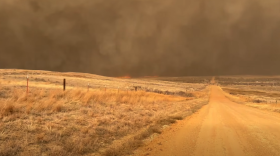State legislators repealed a longstanding sales tax exemption on motor vehicle sales during the budget crisis of 2017. The Journal Record reports state revenue collections have since recovered and the economy has improved, so State Sen. Kim David has filed a bill to reverse the motor vehicle sales tax.
Journal Record editor Russell Ray talks with KGOU's Jacob McCleland.
FULL TRANSCRIPT
Jacob McCleland: You're listening to the Business Intelligence Report, a weekly conversation about business news in Oklahoma. I'm Jacob McCleland. Our guest is Journal Record editor Russell Ray. Russell, thank you for joining us.
Russell Ray: Hi Jacob. It's good to be here.
McCleland: There are a couple stories I want to talk about today. One is about proposed legislation to restore a tax break on car sales. First, give us some background on this. Why was this tax break repealed to begin with?
Ray: Well it was a very difficult time for the state. Revenue streams for the state were down and several measures designed to boost state revenues had failed. And so the state was in the middle of a financial crisis at the time. So in response lawmakers eliminated a longtime tax exemption on car sales at the end of the 2017 legislative session. And by doing so it generated some badly needed revenue to help keep the state afloat during a difficult time.
McCleland: So how has the auto sales tax affected businesses and consumers here in Oklahoma?
Ray: Well it was enough to prompt the state's auto dealerships to take the state to court over the measure. In the end though state justices upheld the state's repeal of that tax break.
McCleland: Why is State Senator Kim David want to reinstate the tax exemption now?
Ray: Well the reason is we're in a much different place financially. State gross receipts are up. Unemployment rates are down. Several revenue streams have reached historic highs and state officials expect to have $500 million in savings by the end of this year. And so the state has recovered from those difficult financial times so lawmakers now feel it's time to restore the tax exemption on car sales.
McCleland: Let's talk next about the difficulty in recruiting and retaining aerospace engineers in Oklahoma. Why do aerospace firms here find it so hard to get and keep qualified applicants?
Ray: Well we were told that Oklahoma's public education system is one of the main obstacles in recruiting qualified engineers to the state. To lure more engineers to aerospace companies in Oklahoma, we're told the state's overall low ranking for public education must improve.
McCleland: There's already demand for aerospace engineers but that demand is only going to grow, right. Projections Central reports there are more than 1,000 aerospace engineer jobs in Oklahoma. But annual average openings are expected to increase through 2026. Why is demand growing here?
Ray: Well several new companies have entered the aerospace sector and several existing aerospace companies are now expanding their operations. Boeing, for example, added 600 jobs last year and is expected to add about 500 more over the next year.
McCleland: Northrop Grumman Aerospace Systems says the slow pace of getting security clearances is the big impediment. So it sounds like there are a lot of reasons that it's hard to bring aerospace engineers to Oklahoma. What are business leaders here doing to address this?
Ray: Well that's right one. The growing company established its own recruiting and staffing division to attract qualified engineers. The effort was so successful that the division was spun off into a separate subsidiary. Other companies are investing in STEM courses for K through 12 schools in hopes of steering students to careers in science, technology, engineering and mathematics. And there are efforts by both the public and private sectors to market Oklahoma as an ideal place to pursue a career in engineering.
McCleland: Russell Ray the editor of The Journal Record newspaper. Russell thank you for your time.
Ray: Thank you.
McCleland: KGOU and the Journal Record collaborate each week on The Business Intelligence Report. You can follow us on social media or on Facebook and Twitter, @journalrecord and @kgounews.
McCleland: The Business Intelligence Report is also available on our website, kgou.org. While you're there, you can check out other features and podcast produced by KGOU. For instance do you have some lingering question about something in Oklahoma? Or are you curious about this state that we call home? Check out the How Curious podcast with Claire Donnelly to learn about Chinese tunnels in Oklahoma City, Gun turrets on liquor stores and really, really big fish in Oklahoma lakes and much much more. Or if you're looking for the latest from the state capitol, check out Capitol Insider with Dick Pryor and Shawn Ashley. Dick and Sean breakdown the news from the capitol and interview guests. All that and more at kgou.org. You can also subscribe to how curious and Capitol insider on iTunes and Spotify.The Business Intelligence Report is a collaborative news project between KGOU and The Journal Record.
As a community-supported news organization, KGOU relies on contributions from readers and listeners to fulfill its mission of public service to Oklahoma and beyond. Donate online, or by contacting our Membership department.
The Journal Record is a multi-faceted media company specializing in business, legislative and legal news. Print and online content is available via subscription.
Music provided by Midday Static.
Copyright 2018 KGOU








